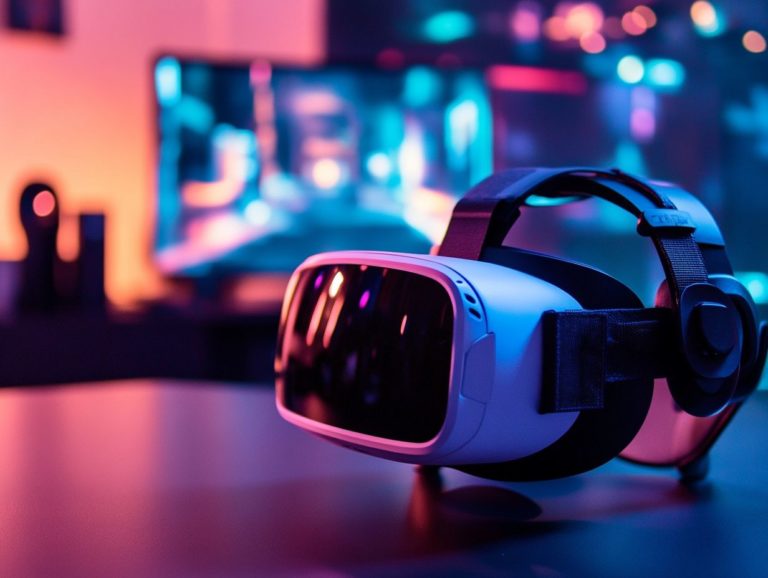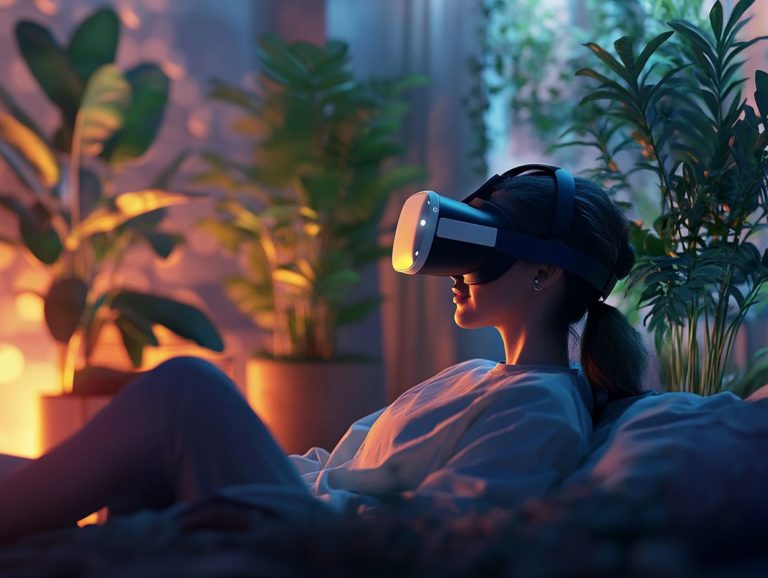5 surprising benefits of vr gaming
Virtual Reality (VR) gaming is revolutionizing the way we experience entertainment, offering far more than just playtime.
This exploration reveals five unexpected benefits of VR gaming, including enhancing cognitive skills, improving hand-eye coordination, and providing a secure environment for exposure therapy.
You ll discover how VR can ignite your creativity, serve as an effective form of physical exercise, and unveil its substantial educational potential.
We also explore the diverse types of VR gaming, potential risks, and the exciting possibilities that lie ahead.
Uncover how this immersive technology is reshaping your experiences and daily life!
Contents
Key Takeaways:
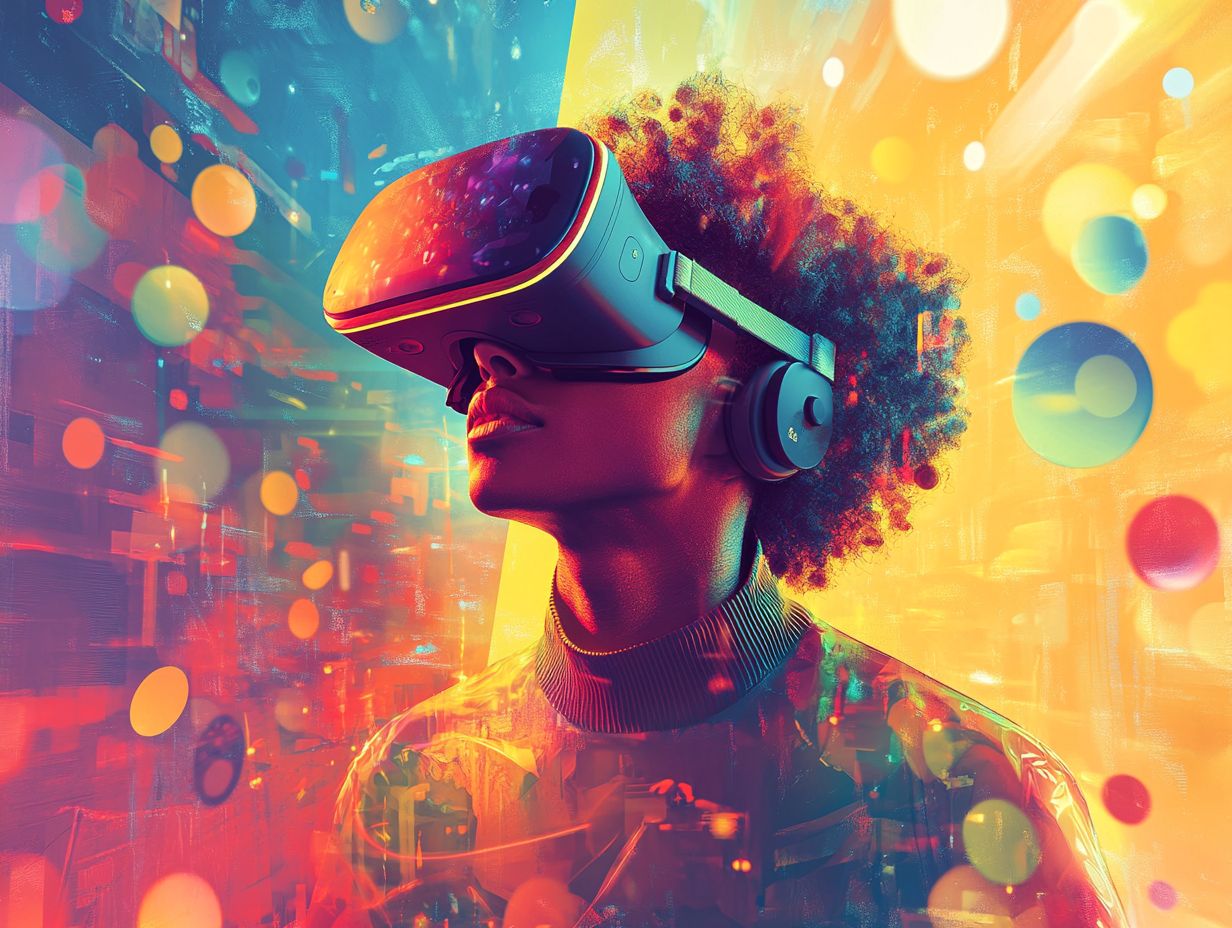
VR gaming can enhance cognitive skills such as problem-solving and decision-making.
Hand-eye coordination and motor skills can be improved through VR gaming, as players must interact physically with the virtual world.
VR gaming provides a safe and controlled environment for exposure therapy, allowing individuals to confront and overcome fears or traumas.
1. Enhances Cognitive Skills
Virtual reality (VR) technology, especially through sleek and user-friendly headsets like the Meta Quest and Apple Vision Pro, has become a remarkable tool for enhancing cognitive abilities.
These engaging experiences stimulate mental engagement in various educational settings, fostering critical thinking and problem-solving skills.
In medical and health-related environments, VR serves as a valuable resource, offering interactive learning opportunities that benefit you as a learner and healthcare professionals alike.
As you navigate through a digitally transformed world, the role of VR in enhancing cognitive skills is truly something to appreciate.
Research from the National Institutes of Health emphasizes how VR can significantly boost memory retention by creating contextual learning scenarios that aid recall.
Imagine exploring complex subjects like biology through 3D models of the human body or intricate ecosystems; these experiences help you make connections that deepen your understanding.
In healthcare, institutions like the Virtual Reality Medical Institute are employing VR for therapeutic purposes, guiding patients through cognitive rehabilitation exercises designed to enhance attention and focus.
These innovations showcase how versatile VR can be in cultivating essential cognitive skills vital for academic pursuits and professional success.
2. Improves Hand-Eye Coordination and Motor Skills
Utilizing VR headsets for gaming, particularly with engaging titles like Beat Saber, significantly enhances hand-eye coordination and motor skills.
This immersive experience transcends traditional gaming, offering a level of interaction that s truly remarkable.
Unlike conventional gaming, where you often find yourself sitting still, VR games compel you to move, swing your arms, and dodge obstacles, transforming your living room into an exhilarating playground.
This active involvement boosts your engagement and cultivates essential motor skills through precise movements and timing.
You might notice yourself sweating and breathing a bit heavier this is a sign of the physical activity at play.
By regularly immersing yourself in these virtual realms, you turn gaming into a workout, promoting not just cardiovascular health but also muscle endurance.
This makes VR gaming an enticing option for anyone looking to combine enjoyment with fitness.
3. Provides a Safe Environment for Exposure Therapy
Virtual reality presents a groundbreaking method for exposure therapy, offering you a safe and controlled environment to confront your fears and phobias.
This innovative approach leads to significant reductions in anxiety and enhances overall mental health outcomes.
By immersing you in customizable virtual environments, therapists can effectively guide you through a gradual exposure to your specific triggers.
For example, tools like EaseVRx leverage VR technology to assist individuals dealing with chronic pain, helping you learn coping strategies and mindfulness techniques in a virtual setting that closely resembles real-life scenarios.
This method not only alleviates discomfort but also encourages social interaction, bridging the gaps for those who find face-to-face encounters challenging.
Ultimately, the integration of VR in therapy enables you to build resilience and improve your overall quality of life.
Explore VR games or technology further to experience these benefits yourself!
4. Boosts Creativity and Imagination
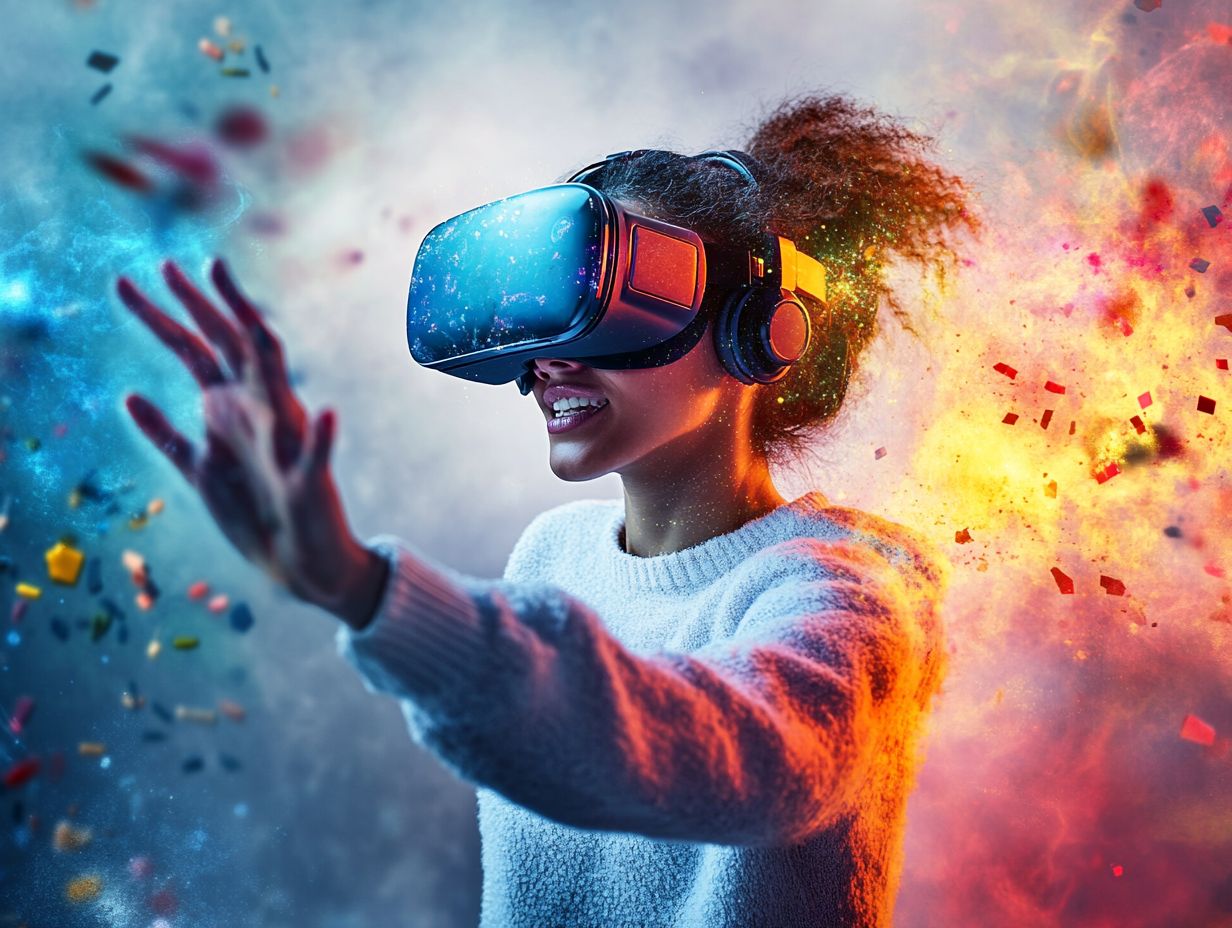
The immersive experience of virtual reality invites you to explore your creativity. It transforms educational settings into vibrant arenas for interactive learning.
In this vivid landscape, you can dive into applications like design, art, and storytelling. This enables you to push the boundaries of your creative expression.
By manipulating 3D environments and visualizing concepts in real-time, you discover fresh ways to engage with ideas. This enhances your cognitive abilities.
This exciting technology sparks your imagination and nurtures innovative thinking. It also sharpens your problem-solving skills.
Digital innovations create unique platforms for your artistic endeavors. You can realize your visions in ways that were once unimaginable.
5. Can Be Used for Physical Exercise
Engaging in virtual reality is a highly effective way to exercise. It offers the enticing benefits of gamification that motivate you to embrace routines while enjoying the process.
This innovative approach blends entertainment with fitness. It encourages you to move your body as you dive into captivating virtual worlds.
VR fitness games like Beat Saber and Ring Fit Adventure invite you to swing, dance, and engage in movements. These activities elevate your heart rate and enhance your coordination and reflexes.
As these platforms expand, they create unique opportunities for collaboration with healthcare professionals. They can tailor VR experiences to promote physical activity in therapeutic settings, making workouts enjoyable and accessible especially for those facing mobility challenges.
How Does VR Gaming Work?
VR gaming immerses you in virtual environments through advanced VR headsets. This crafts an interactive space that captivates your cognitive abilities and delivers experiences far beyond traditional gaming.
This technology relies on advanced systems that track your movements, allowing intuitive navigation in the game world.
When combined with sensory feedback mechanisms like haptic gloves and motion controllers, these systems provide a sense of touch similar to real-life experiences.
Together, these components amplify your presence, elevating the gaming experience to new heights of immersion.
The impact of this technology stretches beyond entertainment. In healthcare, for instance, virtual reality has applications in therapy, rehabilitation, and training, showcasing its transformative potential across various fields.
What Are the Different Types of VR Gaming?
The landscape of VR gaming offers a rich variety of experiences. This ranges from immersive single-player adventures to competitive online play using cutting-edge VR headsets like the Apple Vision Pro and Meta Quest.
Within this diverse realm, fitness-oriented VR gaming stands out. It transforms workouts into exhilarating activities that inspire you to break a sweat while genuinely enjoying the process.
These games incorporate interactive rhythms and challenges, making exercise feel like an exciting adventure rather than a chore.
Educational VR experiences unlock a world of immersive learning. You can delve into historical events or complex scientific concepts in captivating 3D environments, significantly enhancing your retention.
Meanwhile, narrative-driven games draw you in with compelling storytelling. They forge emotional connections that keep you returning for more. Each category nurtures distinct forms of engagement, ensuring your experience is enriching and immensely enjoyable.
What Are the Potential Risks of VR Gaming?
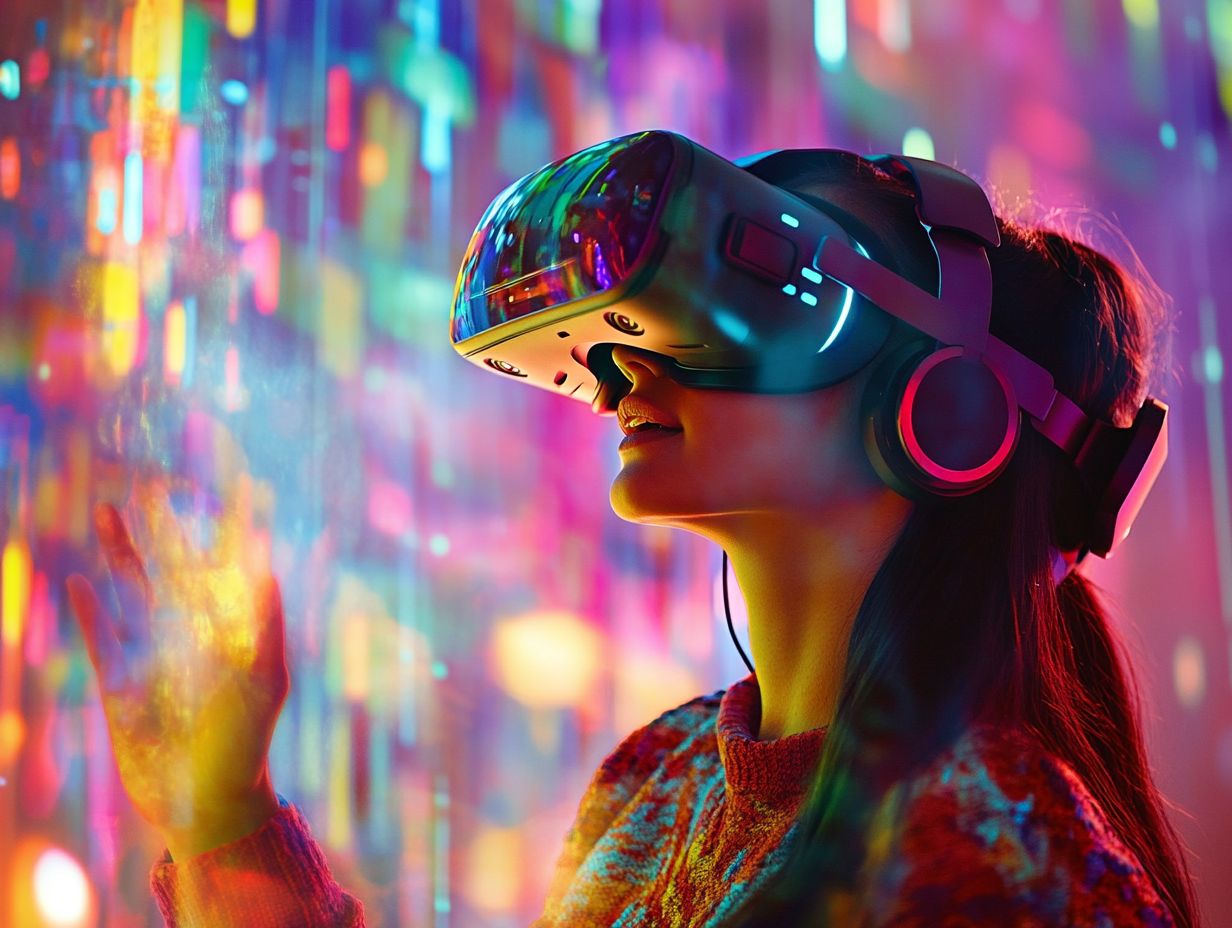
While VR gaming presents several advantages, it also comes with potential risks that merit attention. These risks concern physical well-being and the possibility of social isolation, especially when used excessively or without adequate guidance.
You may find yourself grappling with motion sickness, a result of the disconnect between your physical movements and the virtual landscape. This can lead to discomfort or nausea.
Eye strain is another potential issue; prolonged screen time can cause fatigue and discomfort that you want to avoid.
Diving deep into a virtual world may reduce your face-to-face interactions, impacting the quality of your relationships.
To mitigate these risks, it’s essential to take regular breaks, ensure your seating arrangements are supportive, and adjust settings for maximum comfort.
Moderation is key! Balancing your virtual escapades with real-world connections will enrich both your health and social life.
How Can VR Gaming Be Used in Education and Training?
VR gaming has the potential to transform education and training, offering a learning experience that feels real and engaging. This experience not only sharpens cognitive abilities but also keeps you fully engaged.
Imagine stepping into a virtual classroom where students from various locations can interact within a shared digital space. Learning feels more collaborative and dynamic!
In healthcare training, simulations allow aspiring medical professionals like you to practice surgical procedures and patient interactions in a safe environment. This significantly boosts your skills before you set foot in a clinical setting.
Take a look at programs like the University of Illinois’ “VR in Education” initiative; they showcase just how effective these applications can be.
You ll see marked improvements in student understanding and retention rates, all thanks to those hands-on, realistic experiences that VR provides.
What Are the Future Possibilities of VR Gaming?
The future of VR gaming is exciting! New technologies will enhance your experience and expand its use in many fields, such as education and healthcare.
As these advancements come to life, you’ll find that how you interact with the technology is becoming increasingly intuitive. This enables you to engage in lifelike simulations that go beyond traditional gameplay.
Picture yourself practicing surgical techniques in a virtual operating room or exploring historical events in a vivid, interactive environment! This evolution not only makes learning more engaging but also enhances practical skills training in fields like architecture and aviation.
The integration of VR technology is set to encourage greater collaboration across disciplines. Ultimately, it will pave the way for therapeutic applications and groundbreaking solutions in mental health treatment.
Is VR Gaming Suitable for Everyone?
While VR gaming presents numerous advantages, its suitability truly hinges on individual circumstances. This is shaped by factors such as age, health conditions, and personal inclinations toward user-friendly technology.
Children, for instance, may discover exceptional value in interactive experiences that enhance learning and foster social connections. On the other hand, individuals grappling with specific mental health challenges, like anxiety or social phobia, can find solace in thoughtfully crafted virtual environments designed to promote relaxation.
Accessibility plays a pivotal role in ensuring VR gaming remains inclusive. This allows individuals with physical disabilities to engage comfortably with various platforms.
The importance of tailored experiences cannot be overstated! Customization significantly enriches user experience and creates a welcoming atmosphere for a diverse range of demographics.
Frequently Asked Questions

1. What are the surprising benefits of VR gaming?
Some surprising benefits of VR gaming include improved cognitive abilities, enhanced social interaction, stress relief, pain management, and improved physical fitness. Explore the amazing world of VR gaming today and discover these benefits for yourself!
2. How does VR gaming improve cognitive abilities?
VR gaming requires players to think critically and solve problems. This improves memory, spatial awareness, and attention span.
Yes! VR gaming lets players interact in a virtual world, no matter where they are. This boosts social skills and helps reduce feelings of isolation.
4. How does VR gaming provide stress relief?
The engaging experience of VR gaming transports players to different environments. This helps them disconnect from reality and lower stress levels.
5. Is VR gaming beneficial for pain management?
Absolutely! Studies show that VR gaming effectively distracts users from pain. It allows them to focus on enjoyable experiences instead.
6. Can VR gaming improve physical fitness?
VR gaming offers a fun way to get fit. Many games involve physical movement, like dancing or boxing, which can boost cardiovascular health and muscle strength. Additionally, exploring how VR can enhance your gaming experience can further elevate your fitness journey.


